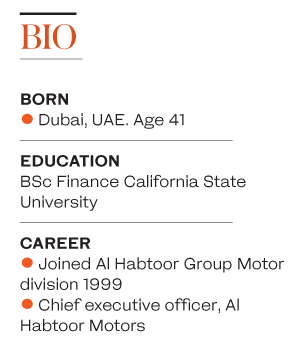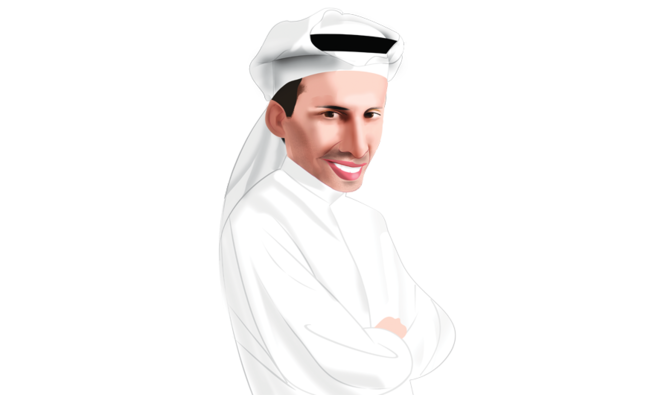DUBAI: Over the course of a morning in his office in Deira, Dubai’s traditional business district, Ahmed Al-Habtoor talked eloquently and expertly about the motor business in the UAE and the Arabian Gulf, about customers’ likes and dislikes, about the tough times the industry has faced recently, about his best-selling models, and about the importance of the sector within the UAE economy.
Then, he dropped a small bombshell. He is always chauffeurdriven, and seldom gets behind the wheel of any of the luxury vehicles he trades daily. “I don’t care about driving cars, I care about selling them,” he revealed.
From the youthful chief executive officer of Al Habtoor Motors, who could have his pick of Bugattis, Bentleys, McLarens and other “fast boys toys,” that was quite a revelation.
“I don’t like driving, I like to be on my phone checking emails and messages. I don’t have the patience to look for parking, and anybody who can afford to have a driver should do so,” he added.
So Al-Habtoor is, in more senses than one, a driven executive. The motor division is a key part of the Al Habtoor conglomerate, started by his father, the group chairman Khalaf, in the 1970s as an engineering business but which has expanded through real estate, hotels and hospitality, to education and entertainment.
Motors has been an integral pillar of the Habtoor portfolio since it was set up in 1983 to handle the Mitsubishi franchise in the UAE. “We have strict corporate governance, law, a constitution in the company. The rules are set and we are here to implement the directions of the chairman. We have our own ideas, we try to be creative, but it is a well-established, solid company with very strong roots,” he said.
 here is still a large number of workers — whom he called “partners” — who can date their employment back to the very beginning of the Mitsubishi franchise.
here is still a large number of workers — whom he called “partners” — who can date their employment back to the very beginning of the Mitsubishi franchise.
He admits to two alternative frustrations in his job, depending on the economic climate.
“When the market is active and business is fantastic, I get frustrated at the pressure of delivering to my clients. I’m just busy, trying to meet the expectation of delivering the right product at the right time,” he explained. “The other frustration is when the market is challenging and low, I’m busy trying to be busy, trying to find business. It’s all about being busy.”
For the past few years, the “challenging” market has been to the fore, as he candidly admitted. The fall in the oil price in 2014-15 began to affect the economies of the energy exporters of the Arabian Gulf toward the end of the following year, and the motor sector was seriously hit. Sales volumes declined sharply — compounded by government spending cuts and some policy decisions.
“I think in 2017 the volume was acceptable. In 2018, it dropped when the government implemented VAT. I don’t think VAT was the wrong decision, but it had a negative effect. It was implemented when the market was in a weak situation. If the market was booming, it would have been much easier for us,” he said.
Al Habtoor Motors’ longevity gives its CEO a perspective on the forces that shape the industry. “It’s a cycle. There is always a cycle every 6-8 years. When oil prices started to fall it had an effect. In our region, government spending is the key to moving the economy. Not only in Dubai, but the whole of the UAE.”
He estimated that the motor industry was the second biggest sector in the UAE’s non-oil economy, behind real estate, but saw no real linkage in the simultaneous downturns in property and motor sales.
The other factor that affected car sales — especially in the high volume and fleet car business — was the increasing reluctance of banks in the UAE to continue previous levels of finance to small and medium enterprises (SMEs) during the worst of the downturn.
“It was not a very wise decision to withdraw support from SMEs. The economy depends on large companies, but at the end of the day, consumption comes out of the (medium) and small businesses. Uncertainty and insecurity in the market made a lot of people stay away from buying,” he said.
Al-Habtoor estimated that car sales volumes in the fleet business were down by 50 percent from the highs of 2015, as they were across the whole of the volume motor business. “Last year was very challenging, but thankfully we managed all the challenges,” he said, on the back of an upturn in business measured across the whole of last year.
He has reason to be more optimistic in the current year. “There has been stimulus to the economy, Expo 2020, and the confidence in the market improved. The changes to visa arrangements, the reduction of license fees — all these are having an effect,” he said.
On the “Expo effect” — the expected boost to the UAE economy from the huge business fair planned for next autumn — he was cautiously positive. “We’ve seen that coming through already. Now it is nominal, but we are seeing green shoots. It is not a big effect yet but it is happening, and the more we go toward October next year the more benefit will come,” Al-Habtoor said, adding that he was confident of getting back to 2015 levels eventually.
That is good news for the Mitsubishi, Fuso, Jac and Chery marks that are Habtoor’s staple. But the group also has an impressive stable of luxury cars, with the dealerships for Bentley, the McLaren sports brand, and the super-car Bugatti, in the UAE
The UAE’s reputation for glamorous, extravagant cars — even down to the Dubai police fleet — is a global phenomenon, and Al-Habtoor does not think it will change any time soon, even in challenging economic circumstances.
“A lot of people want beautiful cars and the best. It always was like that, it still is now and it will be in the future. The UAE and Dubai is always about the best. It’s in the culture of the city. There is no country on this planet where you will see Bentleys, McLarens and Bugattis as much as in the UAE,” he said.
The economics are different in the luxury brands, which were not as badly hit by the oil-related slump as the volume business. “The luxury end was affected by the downturn, but it’s more resilient, it’s OK,” he said.
“In the first four months of this year, we’re the number one dealer in the world for Bentley, and have consistently been among the biggest Bentley dealers in the world, if not the biggest. When luxury goods are moving, not just cars, but jewelry and other things, I feel that the economy will come back soon,” he said.
Bentley sales have been given a boost by the introduction at the end of last year of a new Continental GT, and by the continued appeal of the Bentayga, the company’s first move into the SUV market, which has huge appeal for motorists in the region. Deliberately priced at below 1 million dirhams ($272,250), the luxury SUV aims to take on other upmarket four-wheel-drive vehicles.
He seemed especially pleased with the performance of the McLaren range within his portfolio, vying with other more famous brands in the lucrative but very competitive sports car segment — another best seller in the region.
At the top end, McLaren competes with the best in the sports car market, and its BP23 model sells at more than 10 million dirhams. “There are only 116 vehicles around the world and we have six of them. In that ultimate series sector, McLaren is dominating,” Al-Habtoor said.
Then there is Bugatti, the French super-sports car whose Chiron model is one of the most expensive seen on the UAE’s roads, selling at around 12 million dirhams. Last year, the company sold 12 of them, Al-Habtoor said, but any ideas that McLaren is competing with, and cannibalizing sales, of Bugatti were dismissed.
“That’s like comparing a normal plane with a UFO. I once drove a Bugatti on a track at over 200km and it was as if I was having a picnic in the garden — you don’t even feel it,” he said.
Occasional high-speed track driving, apparently, is one of the few occasions he likes to give the chauffeur a day off.


























